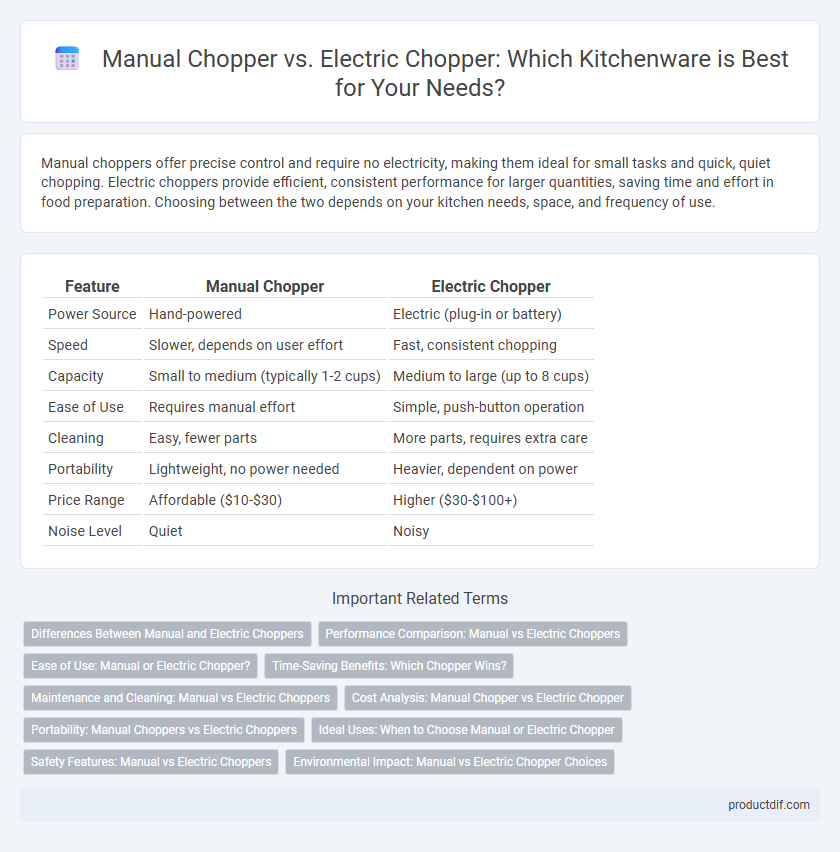Manual choppers offer precise control and require no electricity, making them ideal for small tasks and quick, quiet chopping. Electric choppers provide efficient, consistent performance for larger quantities, saving time and effort in food preparation. Choosing between the two depends on your kitchen needs, space, and frequency of use.
Table of Comparison
| Feature | Manual Chopper | Electric Chopper |
|---|---|---|
| Power Source | Hand-powered | Electric (plug-in or battery) |
| Speed | Slower, depends on user effort | Fast, consistent chopping |
| Capacity | Small to medium (typically 1-2 cups) | Medium to large (up to 8 cups) |
| Ease of Use | Requires manual effort | Simple, push-button operation |
| Cleaning | Easy, fewer parts | More parts, requires extra care |
| Portability | Lightweight, no power needed | Heavier, dependent on power |
| Price Range | Affordable ($10-$30) | Higher ($30-$100+) |
| Noise Level | Quiet | Noisy |
Differences Between Manual and Electric Choppers
Manual choppers rely on hand-powered operation, offering greater control over chopping consistency and requiring no electricity, making them ideal for small tasks and portability. Electric choppers feature motorized blades that provide faster, more uniform chopping with less physical effort, suited for larger quantities and frequent use in busy kitchens. Differences between manual and electric choppers include speed, ease of use, maintenance, and noise levels, with manual choppers being quieter and simpler to clean compared to their electric counterparts.
Performance Comparison: Manual vs Electric Choppers
Manual choppers offer precise control and quiet operation, ideal for small tasks and minimal ingredients, while electric choppers provide faster and more consistent results, making them suitable for larger quantities and tougher ingredients. Performance-wise, electric choppers deliver powerful motorized blades that efficiently handle dense vegetables and nuts, whereas manual choppers rely on user effort, affecting chopping speed and uniformity. Choosing between the two depends on frequency of use, ingredient type, and desired chopping speed.
Ease of Use: Manual or Electric Chopper?
Electric choppers offer superior ease of use with their one-touch operation and consistent chopping results, ideal for quick meal prep. Manual choppers require physical effort and time, making them less convenient for frequent or large-volume use. For effortless and efficient kitchen tasks, electric choppers outperform manual options in user-friendly design and speed.
Time-Saving Benefits: Which Chopper Wins?
Electric choppers significantly reduce food preparation time by efficiently processing ingredients within seconds, making them ideal for busy kitchens. Manual choppers require physical effort and longer chopping durations, which can be time-consuming for large quantities or tough ingredients. For enhanced time-saving benefits, electric choppers outperform manual options due to their speed and consistent performance.
Maintenance and Cleaning: Manual vs Electric Choppers
Manual choppers require minimal maintenance, with simple disassembly and hand-washing that prevents motor damage and extends lifespan. Electric choppers demand more careful cleaning to avoid water exposure to the motor, often requiring detachment of parts for thorough washing and occasional lubrication of blades. Choosing between manual and electric models hinges on balancing ease of cleaning with durability and performance in busy kitchen environments.
Cost Analysis: Manual Chopper vs Electric Chopper
Manual choppers generally offer a lower upfront cost compared to electric choppers, making them an economical choice for budget-conscious buyers. Electric choppers often involve higher initial investment but provide faster, more consistent chopping results, which can save time and effort in the long run. When considering cost analysis, manual choppers save on electricity expenses, while electric choppers may require maintenance costs that affect overall affordability.
Portability: Manual Choppers vs Electric Choppers
Manual choppers offer superior portability due to their lightweight design and lack of electrical components, making them ideal for outdoor use and small kitchens. Electric choppers require a power source, limiting mobility but providing faster and more efficient food processing. Choosing between the two depends on the need for convenience versus flexibility in kitchenware portability.
Ideal Uses: When to Choose Manual or Electric Chopper
Manual choppers are ideal for small, quick tasks like chopping herbs or garlic, offering precise control and quieter operation without the need for electricity. Electric choppers excel in handling larger quantities and tougher ingredients such as nuts, onions, or vegetables, saving time and reducing physical effort with their powerful motors. Choosing between manual and electric choppers depends on the volume of food prep, frequency of use, and desired convenience in the kitchen.
Safety Features: Manual vs Electric Choppers
Manual choppers offer enhanced safety with no electrical components, reducing the risk of electrical hazards and overheating, making them ideal for simple, low-risk kitchen tasks. Electric choppers, while equipped with safety locks and automatic shut-off features, require caution due to sharp blades and powered mechanisms that can pose injury risks if not correctly handled. Choosing between manual and electric choppers depends on balancing convenience with the specific safety features designed to protect users during food preparation.
Environmental Impact: Manual vs Electric Chopper Choices
Manual choppers generate zero emissions during use, relying solely on human power, which significantly reduces their carbon footprint compared to electric choppers that consume electricity and contribute to energy demand. The material durability and recyclability of manual choppers often result in less environmental waste than electric models, which contain electronics and batteries requiring specialized disposal. Choosing a manual chopper supports sustainable kitchen practices by minimizing reliance on non-renewable energy sources and lowering overall environmental impact.
Manual Chopper vs Electric Chopper Infographic

 productdif.com
productdif.com